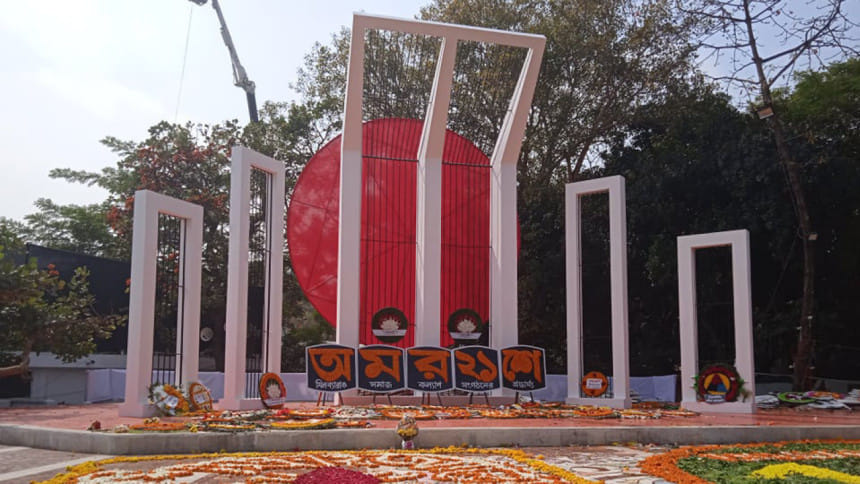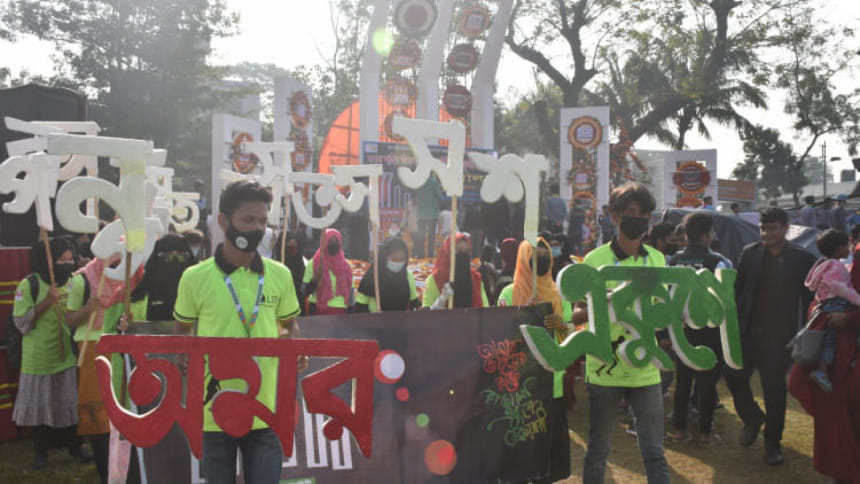Nation pays homage to language heroes, world observes Mother Language Day

The nation is paying deep respects to the martyrs of 1952 Language Movement, marking 'Amar Ekushey', the Language Martyrs' Day and International Mother Language Day.
The Language Movement, a significant event in the nation's history, was aimed at establishing the right to speak in the mother tongue as well as protecting self-identity, culture and heritage.
President Abdul Hamid and Prime Minister Sheikh Hasina paid tributes to the martyrs of Language Movement early today.
On behalf of President Abdul Hamid, his Military Secretary Major General SM Salahuddin Islam paid homage by placing a wreath at Central Shaheed Minar at one minute past midnight.
On behalf of the Prime Minister, her Military Secretary Major General Naquib Ahmed Chowdhury paid homage by placing a wreath at the Central Shahid Minar at the same time.

Walking barefoot to the Shaheed Minar with wreaths and flowers singing 'Amar bhaiyer rakte rangano Ekushey February', people from all walks of life are paying rich tributes to the heroes of the Language Movement who laid down their lives for earning recognition of Bangla as the state language in erstwhile Pakistan.
On February 21, 1952, students and the common people in Dhaka took to the streets in protest against the then Pakistan government's denial of Bangla as the state language and imposition of Urdu as the only official language of Pakistan.
Salam, Barkat, Rafiq, Jabbar and a few other brave sons of the soil were killed in police firings on this day in 1952 when students came out in a procession from the Dhaka University campus breaching section 144 to press home their demand for the recognition of Bangla as a state language.
Being a source of ceaseless inspiration, 'Amar Ekushey' inspired and encouraged the nation to a great extent to achieve the right to self-determination during the struggle for freedom and the Liberation War.
With Language Movement, the nation got the recognition of Bangla as its mother language and attained its long-cherished independence under the charismatic leadership of Father of the Nation Bangabandhu Sheikh Mujibur Rahman in 1971.

The day is being observed across the world as Unesco recognised Ekushey February as the International Mother Language Day on November 17, 1999.
The national flag will fly half-mast on all major buildings of Dhaka University. Black flags will also be hoisted.
Meanwhile, cultural organisations will observe the day with various programmes, commemorating the Language Movement martyrs.
Organisations including the Bangladesh Shilpakala Academy, Liberation War Museum, Chhayanaut, and others will organise special programmes throughout the day, while government and private television channels, radio stations and other cultural units will also organise special programmes on their respective traditional and online platforms.
The Liberation War Museum will organise a cultural programme at its auditorium at 4pm, featuring a special lecture by Professor Mesbah Kamal.
At the event, recitations will be presented by artists representing different indigenous communities living in the country, and the programme will also feature song performances by the Garo Cultural Academy and dance recitations by the dance troupe Colors of Hill.
Shilpakala Academy will organise a seminar and cultural programme – "Bishwer Shob Desher Matrivasha Rokkha Korbe Bangladesh" – at its National Theater Hall at 6:30pm, featuring participation from different nationals around the world.
Chhayanaut, the country's renowned cultural institution, will broadcast a special programme – "Fagun Masher Agun" – on Facebook and YouTube at 8pm, featuring songs, recitations and a special documentary presentation.
Meanwhile, President Md Abdul Hamid and Prime Minister Sheikh Hasina issued separate messages on the occasion Sunday.
President Hamid said: "The spirit of Amar Ekushey is now an incessant source of inspiration for protecting the own languages and culture of peoples of different languages in the world."
"Many languages in the world are now at the risk of extinction with the passage of time. Extinction of a language means the disappearance of a culture, a nation and a civilisation from the face of the earth."
"So, the people of the world must raise their voice for protecting the language and culture of all ethnic groups, including the development of their respective mother tongues and culture."
Prime Minister Sheikh Hasina said, this year's theme of International Mother Language Day – "Using technology for multilingual learning: Challenges and opportunities" – is very befitting, as the government has been working for a long time to implement an equitable and inclusive education policy through the use of digital technology.
"We have established the International Mother Language Institute, taken initiatives to preserve endangered languages and protect their dignity, and ensured the use of the Bangla language in the ICT. Also, the government is continuing its efforts to get Bangla recognised as the official language of the United Nations," she said.

 For all latest news, follow The Daily Star's Google News channel.
For all latest news, follow The Daily Star's Google News channel. 



Comments